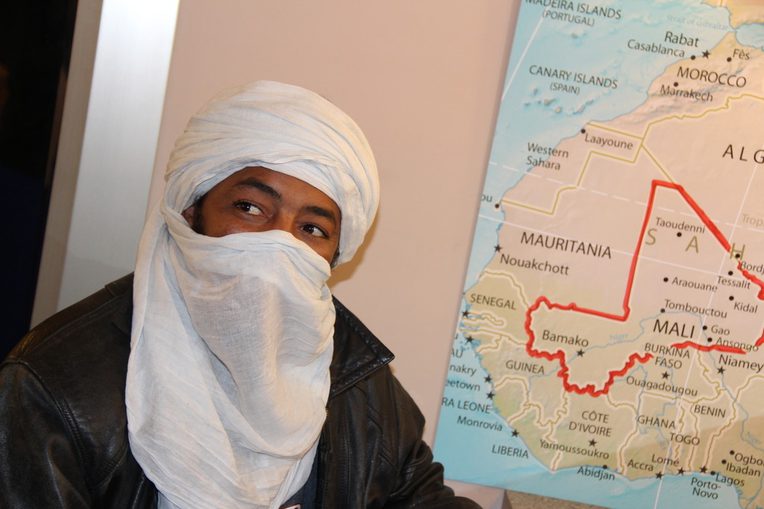A Nation’s Wounded Heart: Music in Post-War Mali
From the Series: Mali, March 2012
From the Series: Mali, March 2012

Until March 22nd 2012, the African nation of Mali was often described as one of the most culturally diverse, tolerant, and musical places on the continent. Sparked by a faction of the military that seized power from the government just weeks before scheduled democratic elections, the coup d’etat sent the country into a tailspin of unanticipated consequences. The occupation of the country’s northern regions by a handful of shadowy, militant groups[1] and their immediate ban on musical expression rocked the nation to its core.

I was in the nation’s capital Bamako at the time teaching music at the single, post-graduate music and art conservatory, Le Conservatoire des Arts et Métiers Multimédia Balla Fasséké Kouyaté (CAMM). By mid-April CAMM suspended classes indefinitely and the majority of its faculty, mostly foreign nationals, had fled the country for good. The U.S. Peace Corps pulled out of the country, and several of Bamako’s music venues closed their doors for lack of patronage. Musicians commissioned by presidential candidates to popularize their campaigns with jingles and theme songs suddenly lost those precious gigs. Wedding gigs and local festivals, the bread and butter of the large majority of local singers and musicians, slowed down to a trickle, and even then, offered little by way of compensation.

By late August 2012, the Islamists gained control of the northern part of the country–the regions of Timbuktu, Gao, and Kidal–and banned all secular music, music videos, and even music cell-phone ringtones. Bamako-based Songrai and Tuareg musicians from these regions, such as Kaira Arby, Baba Sala, and Afel Bocoum (at right) were fearful of singing or speaking out against the ban for fear of retribution on their families in the likes of amputation, stoning, beating, and rape. In the north itself, musical instruments were routinely destroyed and musicians threatened with amputations to the specific parts of their bodies that produce music (fingers for guitarists, tongues for singers)[2] should they try and make any.
Despite the silencing of music in the north, it was still sounding in the other parts of Mali, if only at half the tempo it had prior to March 22nd. In April I returned to Washington D.C. to host the Voice of America’s (VOA) radio program Music Time in Africa and continued to stay in close contact with musicians in Mali. The National Instrumental Ensemble of Mali had more work than most because, as it’s Director, Moussa “Remi” Mariko remarked in an interview with me “the Ensemble does not belong to a president or a minister but the nation.” On August 13th and 14th, when Chiefs of the Economic Community of West African States (ECOWAS) convened in Bamako[3], the Ensemble performed 15 pieces for them – one representing each country. “Even a piece in English for Nigeria!”, said Mariko, “‘Welcome in the Land of Mali, Nigerian People’” he told me proudly. They also continued to play national repertoire because it celebrates Mali’s ethnic ancestry such as “Sundiata” “Touramagan“and “Da Monzon Diarra”.[4] Some Malian artists experienced a boost in international exposure and recognition. Many composed new songs about the crises. Bassekou Kouyaté, one of Mali’s greatest contemporary n’goni players, spoke out during a concert in London. "We have been singing praise songs for the Prophet for hundreds of years. If the Islamists stop people music making they will rip the heart out of Mali."[5]

As the months drew on, the militant groups unified in the north and became Mali’s biggest problem. In January 2013 France intervened when they made advances further south to Gao, Kona, and Diabaly. The intervention was a success but music in Mali continued to fall silent. On January 23rd, the Festival sur le Niger called off all music events for its February 9th Edition. The Festival au Désert, Mali’s biggest music festival, had been canceled for months. Recent interviews in March 2013, nearly one year since the coup d’etat, suggest that the music community in Bamako and the north are at their breaking points. Since January, the Malian government placed a nation-wide, 3 month ban on all public music performances as part of the general State of Emergency. Local musicians’ have completely lost their means of making an already fragile living wage. Mariko’s National Instrumental Ensemble of Mali stands quiet[6]. All weddings, baptisms, funerals, concerts, street parties of any kind are silent.

Will this war succeed in ripping the heart out of Mali after all? Malian music beats strong and healthy overseas, but its health in the homeland is uncertain. The lines of transmission of oral traditions in the north is now broken, instruments have vanished, and some argue that people are getting used to it. Others argue Malian music can never die. As Remi Mariko of the National Instrumental Ensemble said to me last month, “Anna [Heather], there is a Bambara proverb that says ‘Mali be lombo lamba. Ng’a t’i fili.’ That means, “a canoe on the river will rock from strong winds, but it won’t capsize.” That’s Mali!
Heather Maxwell is Host of Voice of America’s English and Bambara language radio program, Music Time in Africa, and Director of Africa Music Programs at VOA’s English to Africa Division. For more information, follow Dr. Maxwell’s blog and radio programs at voanews.com/archive/music-time-in-africa blogs.voanews.com/african-music-treasures and www.lavoixdelamerique.com/archive/music-time-bambara
[1] including Tuareg separatists, Islamist militia (Ansar Dine), Al-Qaeda in the Islamic Maghreb (AQIM), and the Movement for Oneness and Jihad in West Africa (MUJAO) .
[2] articles.washingtonpost.com/2012-11-30/world/36323156_1_northern-mali-tuareg-rebels-islamists. Also www.guardian.co.uk/world/2012/oct/23/mali-militants-declare-war-music
[3]www.magharebia.com/cocoon/awi/xhtml1/en_GB/features/awi/features/2012/08/17/feature-01
[6] Based on a phone interview with the author on March 26, 2013